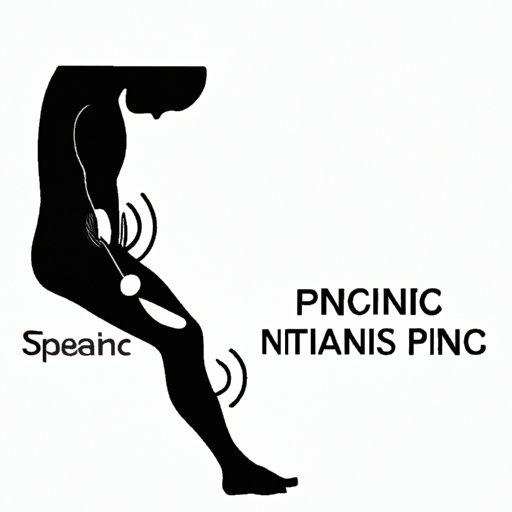
I. Introduction
If you’re experiencing pain, tingling, or numbness in a particular body part, it might be due to a pinched nerve. This condition can affect anyone, regardless of age, but some factors can increase the risk of developing it. In this article, we’ll discuss what a pinched nerve is, its causes and symptoms, and what steps you can take to manage the condition. We’ll also explore non-surgical treatment options and home remedies for relief.
II. Understanding the Causes and Symptoms of a Pinched Nerve
A pinched nerve occurs when pressure is exerted on a nerve or a set of nerves by the surrounding tissues such as bones, cartilage, muscles, or tendons. This pressure can impede the normal functioning of the nerve, causing discomfort. Pinched nerves can happen in various parts of the body, but the condition is most common in the neck and lower back areas.
Some common causes of pinched nerves include:
- Repetitive motions
- Poor posture
- Injury or trauma
- Spinal problems like herniated discs
- Arthritis or other inflammatory diseases
The symptoms of a pinched nerve can vary depending on the location of the affected nerve. Some of the common symptoms are:
- Pain or discomfort in the affected area
- Tingling or a “pins and needles” sensation
- Numbness or weakness in the muscles
- Burning sensation
III. Non-Surgical Treatment Options for Pinched Nerves
Non-surgical treatments are often the first line of defense for managing pinched nerves. Below are some of the treatment options that may help:
Physical therapy:
A physical therapist can work with you to develop an exercise regimen that strengthens the muscles around the affected area, reducing pressure on the affected nerve. This can also improve your posture and range of motion, preventing future pinched nerves.
Chiropractic care:
A licensed chiropractor can perform spinal manipulation to realign your spinal cord and relieve pressure on affected nerves. This treatment can also provide relief from the pain and discomfort caused by pinched nerves.
Stretching and exercise:
Stretching and low-impact exercise can help alleviate pain caused by a pinched nerve. Certain exercises should be avoided, such as anything that puts excessive strain on the areas surrounding the affected nerve.
Over-the-counter pain relievers:
Over-the-counter (OTC) pain relievers such as aspirin or ibuprofen can help alleviate pain and discomfort caused by a pinched nerve. However, long-term use of OTC pain relievers can have side-effects, so speak with your healthcare provider before relying on these medications for relief.
IV. Home Remedies for a Pinched Nerve
If you’re looking for natural ways to find relief from a pinched nerve, the following home remedies may help:
Heat therapy:
Applying heat to the affected area can soothe the pain and provide relief. A hot water bottle, heating pad, or warm towel can be used for this purpose.
Essential oils:
Certain essential oils, such as peppermint or eucalyptus, have anti-inflammatory and pain-relieving properties. You can apply these oils topically to the affected area or inhale them using a diffuser or steam inhalation.
Epsom salt baths:
Soaking in warm water with Epsom salt can also help relieve pain from a pinched nerve. Epsom salt contains magnesium, which can help relax muscles and decrease inflammation.
Topical pain relief creams:
There are many creams and ointments available that contain pain-relieving ingredients like menthol or capsaicin. These provide temporary relief and can be applied directly to the affected area.
V. How to Prevent Pinched Nerves
Preventing a pinched nerve from developing in the first place is the best course of action. Below are some preventative measures that you can take:
Maintain proper posture:
Ensure that your workstation, or any place where you spend extended periods, is ergonomically correct. This means that your chair, computer monitor, desk, and keyboard are all at comfortable angles and distances.
Stretch regularly:
Regular stretching helps keep your muscles limber and supple while also improving your overall movement capability.
Use ergonomic equipment:
If you work in a job that requires you to do repetitive motions, consider purchasing ergonomic equipment that can help alleviate the risk of developing a pinched nerve.
VI. When to See a Doctor for a Pinched Nerve
While most cases of pinched nerves can be treated at home, some situations require medical attention. If you experience any of the following symptoms, it’s important to see your healthcare provider as soon as possible:
- Severe or worsening pain
- Numbness or weakness that is spreading
- Inability to move the affected body part
- Loss of bladder or bowel control
If you experience these symptoms, it could indicate a more serious condition that requires immediate medical treatment. Your healthcare provider may refer you to a specialist like a neurologist or orthopedic surgeon, who can run diagnostic tests and discuss potential treatment options.
VII. Conclusion
A pinched nerve can be a painful and uncomfortable experience, but there are steps you can take to mitigate your symptoms. Non-surgical treatments like physical therapy, chiropractic care, stretching, and exercise can be effective. Home remedies like heat therapy, essential oils, Epsom salt baths, and topical creams can also provide relief. Lastly, preventing the condition in the first place requires good posture, regular stretching, and, when possible, the use of ergonomic equipment. If your symptoms persist, it’s crucial to seek medical attention to rule out any underlying conditions. Remember to be proactive in managing your pinched nerve, and don’t hesitate to seek help when necessary.




